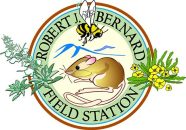Winterer, Juliette (1987)
Host-specificity of the Parasitic Plant, Dodder (Cuscuta californica), in the Coastal Sage Scrub Plant Community.
Advisor: Paulette Bierzychudek.
Cuscuta californica, a parasitic angiosperm that is an agricultural pest, is host-specific because it parasitizes a subsection of the coastal sage scrub community, and it does so in disproportion to their relative abundances. Its most frequent host in coastal sage scrub is Eriogonum fasciculatuma, but Adenostoma fasciculatum is its best host. As a seed, dodder does not exercise host-selection in vitro in response to various water-soluble host chemicals. As a mature plant, dodder is host-selective. Host chemicals serve as recognition cues; the parasite coils around hosts it recognizes as suitable and inserts hausteoria. Other recognition cues may exist. The selective pressures that have shaped host-specificity and host -selectivity of C. cuscuta in coastal sage scrub can be deduced from general prediction about the evolution of these behaviors.
